|
De Albanese dichter en schrijver Bilal
Xhaferri werd geboren op 2 november 1935 in Ninat bij Konispol Zie ook alle tags voor Bilal
Xhaferri op dit blog en ook mijn
blog van 2 november 2010
Janina in the
Fall
Watery vale the
lake of Janina
Slouches in the morning mist,
Curved like tumuli, gull wings skit oer the islet,
The wind bedecks the lanes and alleys with broad leaves,
Exotic mosques, neglected daughters of the Orient,
Pose sadly before Western tourists.
Come from beyond barb-wired border, the sons of Pyrrhos
Pace the port, heads bowed, under the lofty planes.
Autumn as bare as
mini-skirted maidens
Rubs against the bearded, mossy walls,
There, where Frosina once fled from Ali Pasha
And plunged into the lakes frigid waters.
Janina, too, timeworn and abandoned,
Sinks slowly into the lake
In its former, now forgotten glory,
To the muffled beat of war drums.
It subsides, as will new Joannina with its neon lights,
Under streams of cars careening down the asphalt streets,
Under its fresh hotels, the Xenia, Paladion,
To the ringing of bells and the chanting of psalms.
Watery vale - the
lake of Janina,
Sways softly in the morning haze.
Come from beyond barb-wired border, the sons of Pyrrhos
Pace, heads bowed, in the plane-treed alleys,
Pensive their thoughts, seething their sorrow.
Vertaald door Robert Elsie
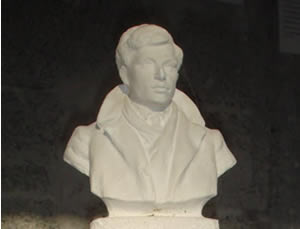
Bilal Xhaferri (2 november 1935 14 oktober 1986)
Detail van een momument
De Nederlandse dichteres Augusta Guerdina Peaux
werd geboren in Simonshaven op 2 november 1859. Zie ook alle tags voor Augusta
Peaux op dit blog en ook mijn
blog van 2 november 2010
In de duinen
Daar is het blanke zonlicht overal
en vult de dag zijn beker tot de rand .
Hij spiedt de kleuren, die in 't fijn kristal
spelen, als in een kelk van diamant .
Lichtdruppen storten in een parelval ;
hij ziet niet, hoe zijn achteloze hand
de blanke lichtdauw spilt, een zilverval
van zon op witgrijs zilvermos en zand .
Stil ligt hij in de diepe duinendel
- een krekel sjirpt, blank zaagje, fijn getand -
Hij ligt te turen naar het kleurenspel
en 't dof oud-zilver van de schaduwkant .
Verlaten weg
De eenzaamheid op zonbeschenen wegen
is erger dan die in de schemer sluipt,
kom haar niet op de volle middag tegen
als zij met huiverkilte uw hart bekruipt.
Zij is en is er niet, zij is doorschenen
gelijk een spooksel van het levend licht,
maar alle leven is uit haar verdwenen
en dood staart uit haar wezenloos gezicht.
Toch houdt zij u in sterke greep gevangen
en trekt een tovercirkel om u heen
en bant u buiten menselijk verlangen
en laat u met verstorvenheid alléén.
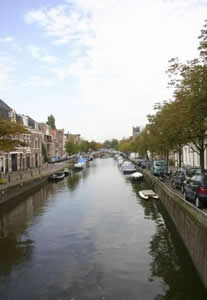
Augusta Peaux (2 november 1859 - 23 februari 1944)
Simonshaven
De Oostenrijkse schrijver Leo Perutz werd geboren op 2 november 1882 in Praag. Zie
ook mijn
blog van 2 november 2010 en eveneens alle tags voor Leo Perutz op dit blog.
Uit: Nachts unter der steinernen Brücke
Als sie an das Ende der Belelesgasse gekommen
waren und die Friedhofsmauer zu ihrer Linken sahen, blieb Jäk-kele-Narr stehen
und deutete auf die Tür des Flickschusters Gerson Chalel.
»Sicherlich«, sagte er, »ist des Schusters
Blümchen noch wach. Ich will ihr aufspielen das Lied: Sechs Jahre erst zähl
ich, das Herzist mir fröhlich, so wird sie zur Tür herauskommen und auf der
Gasse tanzen.«
Koppel-Bär wachte auf aus einem Traum von einer
warmen Rettichsuppe mit kleinen Fleischbrocken darin.
»Du bist ein Narr«, brummte er. »Wenn der Messias
kommt und die Kranken heilt, du wirst ein Narr bleiben. Was schert mich des Schusters
Blümchen? Was soll mir ihr Tanzen? Ich bin krank vor Hunger in allen meinen
Glie-dern.«
»Wenn du bist krank vor Hunger, so nimm ein
Messer, schleif es und häng dich auf«, sagte Jäckele-Narr, und dann nahm er
seine Geige vom Rücken und begann zu spielen.
Aber soviel er auch spielte, des Schusters
Töchterchen wollte nicht kommen. Jäckele-Narr ließ die Geige sinken und dachte
nach. Dann ging er über die Gasse und blickte durch das offene Fenster in des
Schusters Stube.
Sie war dunkel und leer, die Stube, aber aus der
Kammer kam ein Lichtschein, und Jäckele-Narr sah den Schuster und sein Weib,
die saßen auf niederen Schemeln einander gegenüber und sangen die Sterbegebete
für ihr Kind Blümchen, das sie am Tag zuvor begraben hatten.
»Sie ist tot«, sagte Jäckele-Narr. »So ist denn
der Schuster auch vom Himmel herab auf die harte Erd gefallen. Ich habe nichts
und möchte doch alles dafür geben, nur daß sie noch am Leben wär. So klein war
sie, und doch war es mir, wenn ich sie sah, als wärdie Welt in ihrem Aug.
Fünf Jahre war sie alt und muß nun auch die kalte Erde kauen.«
»Wenn der Tod zu Markt geht, kauft er alles«,
murmelte Koppel-Bär. »Nichts ist ihm zu klein, nichts zu gering.«
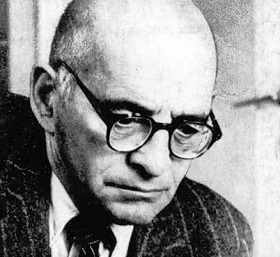
Leo
Perutz (2 november 1882 25 augustus 1957)
De Franse schrijver en moralist Jules
Amédée Barbey d'Aurevilly werd geboren op 2 november 1808 in
Saint-Sauveur-le-Vicomte (Manche). Zie ook alle tags
voor Jules
Barbey d'Aurevilly
op dit blog en ook mijn
blog van 2 november 2010
Uit: Les
Diaboliques
Dans la plupart de ces petites villes que nous
traversâmes, les réverbères, ce luxe tardif, étaient rares, et on y voyait
certainement bien moins que sur les routes que nous venions de quitter. Là, du
moins, le ciel avait sa largeur, et la grandeur de l'espace faisait une vague
lumière, tandis qu'ici le rapprochement des maisons qui semblaient se baiser,
leurs ombres portées dans ces rues étroites, le peu de ciel et d'étoiles qu'on
apercevait entre les deux rangées des toits, tout ajoutait au mystère de ces
villes endormies, où le seul homme qu'on rencontrât était - à la porte de
quelque auberge - un garçon d'écurie avec sa lanterne, qui amenait les chevaux
de relais, et qui bouclait les ardillons de leur attelage, en sifflant ou en
jurant contre ses chevaux récalcitrants ou trop vifs... Hors cela et
l'éternelle interpellation, toujours la même, de quelque voyageur, ahuri de
sommeil, qui baissait une glace et criait dans la nuit, rendue plus sonore à
force de silence :
Où sommes-nous donc, postillon ?... rien de
vivant ne s'entendait et ne se voyait autour et dans cette voiture pleine de
gens qui dormaient, en cette ville endormie, où peut-être quelque rêveur, comme
moi, cherchait, à travers la vitre de son compartiment, à discerner la façade
des maisons estompée par la nuit, ou suspendait son regard et sa pensée à
quelque fenêtre éclairée encore à cette heure avancée, en ces petites villes
aux moeurs réglées et simples, pour qui la nuit était faite surtout pour
dormir. La veille d'un être humain, - ne fût-ce qu'une sentinelle, - quand tous
les autres êtres sont plongés dans cet assoupissement qui est l'assoupissement
de l'animalité fatiguée, a toujours quelque chose d'imposant.
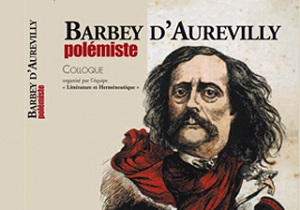
Jules
Barbey d'Aurevilly (2 november 1808 23 april 1889)
De Russische dichter, schrijver en Christelijk mysticus Daniil
Leonidovich Andreyev werd geboren op 2 november 1906 in Berlijn. Zie ook alle tags voor Daniil Andreyev op dit blog
en ook mijn
blog van 2 november 2010
Uit: The Rose of the World
The purpose of
this book is to set out that worldview in an exhaustive manner, helping the
reader to see how, though dealing with the preternatural, it at the same time
holds the key to understanding current events and the fate of each of us. This
is a book that, if God saves it from destruction, will be laid, as one of many
bricks, in the foundation of the Rose of the World, at the base of a Community
of all humanity.
There exists an entity that for many centuries has proclaimed itself the lone,
steadfast unifier of all people, shielding them from the danger of all-out
warfare and social chaos. That entity is the state. Since the end of the tribal
period, the state has been of vital necessity at every historical stage. Even hierocracies,
which attempted to replace it with religious rule, simply became variations of
the selfsame state. The state bonded society together on the principle of
coercion, and the level of moral development necessary to bond society together
on some other principle was beyond reach. Of course, it has been beyond reach
even until now, and the state has remained the only proven means against social
chaos. But the existence of a higher order of moral principles is now becoming
evident, principles capable not only of maintaining but also of increasing
social harmony. More important, methods for accelerating the internalization of
such principles are now taking shape.
In the political history of modern times, one can distinguish two international
movements diametrically opposed to one another.
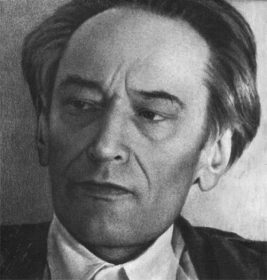
Daniil Andreyev (2
november 1906 30 maart 1959)
|



